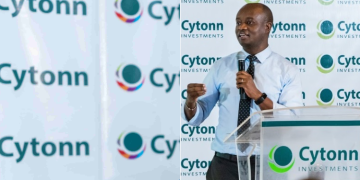I am writing this piece from a point of acute knowledge. Having been a practising classroom teacher for over 20 years, I have interacted with over 100 brands of commercial exams. I have very little faith in them. I am aware of the havoc they wreak in schools. Let me tell you my story, starting with a short anecdote below:
A sad story is told of a top private school that subjected its KCPE candidates to a record forty-two printer exams in just one school year. That translates to two full sets of exams every week. For an entire year, the class lived under a relentless cloud of tests, drills, papers, invigilation, marking, and more drills. They never tasted a normal school week. They were permanently imprisoned in perpetual examination mode – an academic treadmill with no breathing room and no humane learning rhythm. One can only imagine the psychological torment those children endured.
But even that is not the saddest part.
The heartbreaking moment came when the KCPE results were released: not a single learner in that heavily drilled class scored 400 marks, yet in the 42 printer exams, the class mean was always above 410 marks. Not one learner scored a 400 in the final KCPE exam. After forty-two commercial exam papers, after months of panic-driven rehearsal, after a year of anxiety, fatigue, and mental exhaustion, the class posted one of the weakest performances in its history.
Printer exams are bogus
That outcome alone exposes the brutal truth: printer exams are bogus. They are useless. They are a monumental waste of time, money, energy, and hope. If forty-two different sets of these commercial papers could not yield even one respectable score, then their value is not just questionable – it is non-existent. We must criminalize printer exams.
The big question then is this: what exactly is the value of these so-called printer exams? What do they actually contribute to learning? What purpose do they serve besides exhausting learners, confusing teachers, and padding the pockets of exam cartels? If they cannot improve performance, strengthen understanding, or prepare learners for the real KNEC exams, then they deserve only one label: bogus. And if they are bogus, then they must be banned.
There is no softer way to put it. Printer exams are wrecking the integrity of education. They mislead teachers. They torment learners. They distort assessment. And they commercialise what should be a sacred process of nurturing young minds.
For years, schools have been lured, trapped, and shamelessly exploited by exam printers whose only goal is profit – not pedagogy, not fairness, not curriculum alignment, not child development. Their glossy papers parade under dramatic names – “prediction,” “master forecast,” “ultimate booster,” “final replica,” “hot expected questions” – yet behind the glitter lies academic emptiness. This industry is the education equivalent of online scammers: loud marketing, inflated promises, and zero substance.
Mechanical repetitiveness
These exams must be named for what they are: a con game
Commercial exam papers wreak havoc on learners in ways parents and teachers often fail to see. They encourage rote learning of the worst possible kind. They reduce education to mechanical repetitiveness – drilling, cramming, and memorising predictable patterns.
Also Read: How Parents Can Check Senior School Selections and Pathways for Grade 9 Graduates
Learners are trained to recognise question formats rather than master content. They rehearse instead of understanding. They become passive consumers rather than active thinkers. Their minds are never invited to analyse, connect, apply, critique, or imagine. They become experts in regurgitation, yet novices in reasoning. This is not learning. This is educational sabotage disguised as exam readiness.
And the saddest part? These children genuinely believe they are preparing well. They walk into the national exam brimming with artificial confidence, only to be ambushed by fresh, thoughtful, competency-based questions requiring the intellectual muscles they were never allowed to grow. They freeze. Their confidence collapses. They panic. They feel betrayed. But the betrayal happened long before exam day – it happened when schools abandoned authentic teaching and surrendered children to the deceptive world of printer papers.
Lazy teachers
These commercial exams also make teachers lazy – a truth many resist but must confront. A teacher who depends on these papers gradually stops engaging meaningfully with the curriculum. They stop designing their own assessments. They stop analysing competency progression. They stop reflecting on instructional strategies. The moment printer exams become the default tool, professional judgement begins to wither.
Lesson planning becomes shallow. Revision becomes mechanical. Teachers evolve into mere distributors of photocopied shortcuts rather than professional facilitators of learning. Over time, they lose the very assessment literacy they require to guide learners effectively. It is educational erosion disguised as convenience.
These exams also turn education into a matter of life and death. Learners begin to believe that exams are everything – that their worth, their intelligence, their future, their identity, even their dignity, are tied to marks. Anxiety skyrockets. Pressure intensifies. Joy evaporates. Learning becomes fear. And in this toxic environment, exam malpractice thrives. When printer predictions fail – as they always do – some schools resort to darker shortcuts: cheating, prompting, leaking, manipulating marks. Printer exams create a culture where shortcuts feel normal and ethical practice feels optional.
Let us finally speak the truth as it is: these exams are not developed using any recognised educational science. There is no moderation. No validation. No item analysis. No Bloom’s taxonomy balancing. No cognitive progression. No reliability testing. No alignment to learning outcomes. No table of specifications. What schools are fed is a random cocktail of questions stitched together by individuals motivated purely by market demand. Many questions are misleading, grammatically flawed, cognitively imbalanced, or simply wrong. They flood schools with academic toxins under the banner of preparation.
Commercial cartels
And who is responsible? Commercial cartels. These groups have built empires using fear, anxiety, and desperation in schools. They manufacture panic. They dangle promises. They flood the market with new versions every term. They craft posters more beautiful than the content they contain. They manipulate teachers with slogans like “100% prediction,” “KNEC-aligned,” “sure pass,” and “latest format.” Their goal is not learning – their goal is addiction. They want schools hooked on their papers like a drug, term after term, year after year.
The tragedy is that these bogus papers mislead learners. A child scoring 90% in a printer exam enters the real KNEC exam with false confidence. But once they face authentic questions requiring interpretation, reasoning, and creativity, they crumble. They feel defeated. They blame themselves. Yet the fault lies squarely with schools that exchanged genuine teaching for commercial shortcuts.
Also Read: Why Kenyan Teachers Today are Demoralized, Disrespected and Powerless
This is why printer exams must be banned. They dilute education. They mislead teachers. They corrupt the assessment. They traumatise learners. They distort curriculum interpretation. They enrich cartels. They weaken professionalism. They have absolutely no place in a serious academic environment.
Return to authenticity
The future of education demands that we return to authenticity. Schools must anchor assessments in internal tools developed by competent teachers who understand the curriculum. They must embrace genuine pedagogy, not predictions. True preparation comes from concept mastery, not photocopied shortcuts.
It is time to dismantle the entire culture of printer exams. It is time to restore dignity to teaching, sanity to assessments, and humanity to learning. It is time to protect children from the academic poisons disguised as predictions.
Commercial exams must fall – for the sake of children, for the sake of teachers, and for the future of education. Criminize printer exams.
This article was written by Ashford Kimani. He teaches English and Literature in Gatundu North Sub-county and serves as Dean of Studies. The views expressed in this opinion piece are the authors’ own and do not represent The Kenya Times’ editorial position.
Follow our WhatsApp Channel and X Account for real-time news updates.




















![Billions Each Top Kenyan Bank Has Made So Far In Profits This Year [List] Q3 2025 Results For Equity, Kcb, Co-Op, Absa And Other Banks]( https://thekenyatimescdn-ese7d3e7ghdnbfa9.z01.azurefd.net/prodimages/uploads/2025/11/C0-OP-KCB-Equity-Absa-360x180.png)






















































